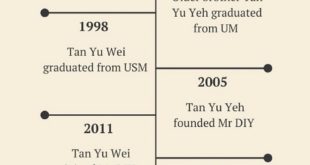The optical industry in Singapore used to belong to the realm of mom and pop stores. Then Owndays hit Singapore like a truck,
In 2016, just three years after the first outlet opened in Plaza Singapura, the brand hits S$ 36 million in total sales in Singapore.
Today, the franchise numbers over 28 stores islandwide.
Owndays Changed The Eyewear Landscape
When Owndays landed in Singapore, it changed the landscape of the eyewear industry.
Traditionally, glasses which costs over S$ 400 a pair took up to two weeks to be prepared.
In contrast, the brand’s S$ 98 to S$ 198 fixed pricing system for its prescription lenses took just 20 minutes to make and outshone existing business models.
Its contact lenses, selling at S$ 30 for a box of 30 pairs, are also a lot cheaper than those from brands like Acuvue, which are selling dailies for about S$ 58 for a box of the same number of pairs.
Optical businesses scrambled to keep up with Owndays’ prices, and the trend towards glasses-as-fashion shifted the industry towards one subsisting on a higher turnaround.

Currently, the Japanese retailer has over 180 outlets in 10 different countries worldwide.
In 2017, it raked in a global revenue of S$ 140 million.
In 2018, it sold an average of 6,000 pairs of glasses per week in Singapore, with one-fifth of its customers buying at least two pairs of glasses from the brand every year.
This shows that Singapore remains ‘prime real estate’. According to a 2017 report, the industry is set to reach US$ 400 million in revenue in the near future.
Demand isn’t set to stop increasing anytime soon, due to an ageing population and an uptick in those afflicted with myopia.
Owndays Faces A Retail Problem
Owndays’ manic incursion into retail might seem reckless given the retail slump over the past couple of years, but brick and mortar stores accounted for 87 per cent of global retail eyewear sales in 2019.
According to a research article, consumer’s preferences for personalised experiences drew them to retail channels for their optical purchases rather than online channels.

While Owndays has been relatively quiet about its businesses since the Covid-19 pandemic struck, it’s no secret that retail costs have been shutting stores down.
Singaporean malls are becoming ghost towns and property owners dragged their feet in giving their tenants’ property tax rebates despite government subsidies.
Singaporean businesses have quoted high rental costs as the key issue.
Local Brands Have Been Sprouting Up
A few relatively new local online startups — Foptics, Monocle and Two Of A Kind — are offering eyewear and contact lenses at highly competitive prices.

Foptics offers frames and prescription glasses for as low as S$ 35.90 a pair.
Monocle, on the other hand, offers “designer quality” prescription glasses and frames for as low as S$ 85 a pair.
In contrast, Owndays offers prescription glasses and frames at a set price, between S$ 98 to S$ 198 for your first pair.
While Owndays customers get to enjoy 50 per cent off their subsequent pair, their prices still can’t compete with prescription glasses and frames that go below S$ 40.
The prices of Ownday’s contact lenses can’t compete with those from Two of a Kind either.

Two of a Kind sells daily contact lenses at S$ 21 per box, while Owndays contact lenses cost between S$ 30 and S$ 40.
Combined, these three online optics brands offer a premium and affordable eyewear range and outbid Owndays in terms of prices.
Online-Based Brands Can Set Competitive Prices
Singaporean brands won’t face the same types of retail costs that Owndays bears.
Foptics, Monocle and Two Of A Kind are all online-based optic brands that are licensed and approved by Health Sciences Authority (HSA).
Each brand has opened only one retail store in Singapore to meet business regulation for optometrists. These retail outlets are primarily used to provide customers with the opportunity to test their eye degrees.
They’re also useful physical touchpoints for customers to feel more at ease with buying from an online brand.
If customers already know their eye degree, they don’t have to visit the physical outlet. They can provide this information to the shop online, or visit the shop once to drop off this information and have the lenses delivered at their doors.
During a pandemic where retail is hurting, having a single physical store is a much smaller liability relative to Owndays’ network of retail outlets.
It also reduces overall costs, allowing local brands to price their products much more efficiently. Moreover, as people are staying home, more consumers are turning to online shopping.
In Southeast Asia, e-commerce sales rose by 96 per cent in May and experts agree that this trend is set for the foreseeable future. This may extend to the eyewear industry as well.
Can Owndays Weather A Pandemic?
Although the odds don’t seem to be in Owndays’ favour, this Japanese retailer still has a lot going for it.
Owndays is not just a leading retail eyewear — it’s also a leading fast-fashion eyewear brand.
Owndays hosts over 1,500 styles in its inventory, selling everything from ultra-flexible spectacles made for sports to clear glasses popular among youth.
In contrast, online brands have a far more limited collection. They also don’t offer the same speed that Owndays offer, where you can collect new glasses in 20 minutes or less.
Their speedy service is incredibly convenient and hard to beat. Most online brands only deliver the products after three to seven working days.
Ultimately, the wide range of style choices attracts consumers and no one will ever say no to cheap, quality glasses.
Featured Image Credit: Owndays / Wah So Shiok



